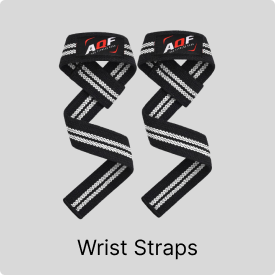How Diet and Exercise Work Together for Lasting Health and Weight

Do you believe that starving yourself and spending hours at the gym is good for long-term health? Well, let me burst your bubble with the fact that starving yourself contributes to long term health issues. Sure, heavy lifting for hours at the gym can help you lose weight quickly but without a balanced diet, you will only lose the essential nutrients your body needs for healthy performance. The truth is that diet and exercise work together for lasting health and weight. How and why? Let’s find out!
How do diet and exercise work together to keep the body healthy?
Diet and exercise are two essential pillars of a healthy lifestyle, and they work together synergistically to promote overall health and well-being. Let’s explore how they complement each other based on scientific findings and expert recommendations:
Energy Balance:
The relationship between diet and exercise begins with the concept of energy balance. If you consume more calories than you expend, the result is obesity. Our bodies are programmed to reserve extra calories in the form of fat.
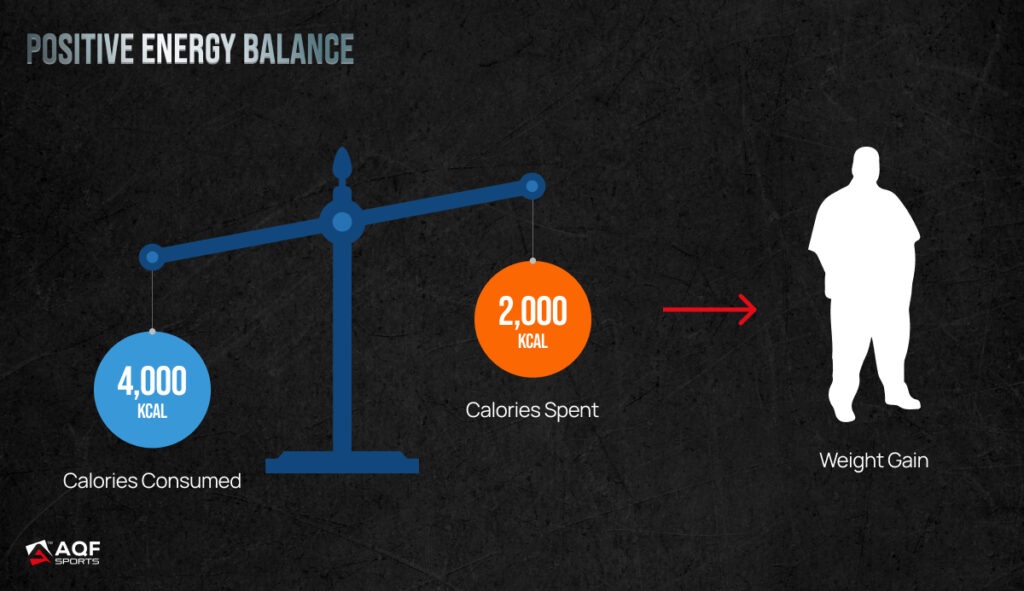
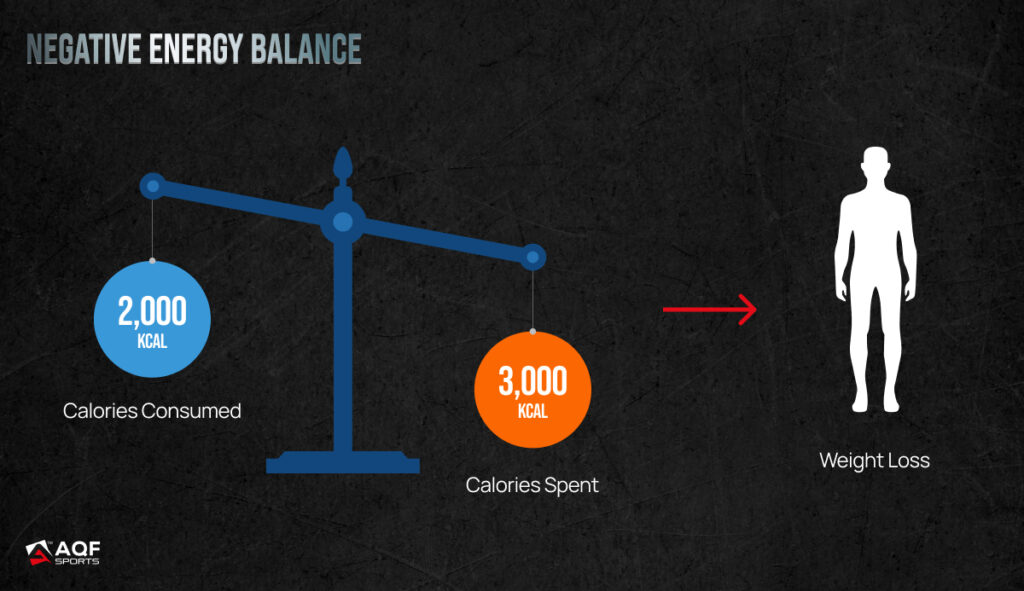
Energy balance is important to combat obesity [1]. It implies that:
Calories Consumption = Calories Expenditure
Pro Tip: Maintain a balance between calorie intake and expenditure to avoid excess weight gain. Caloric excess leads to weight gain, while a deficit results in weight loss.
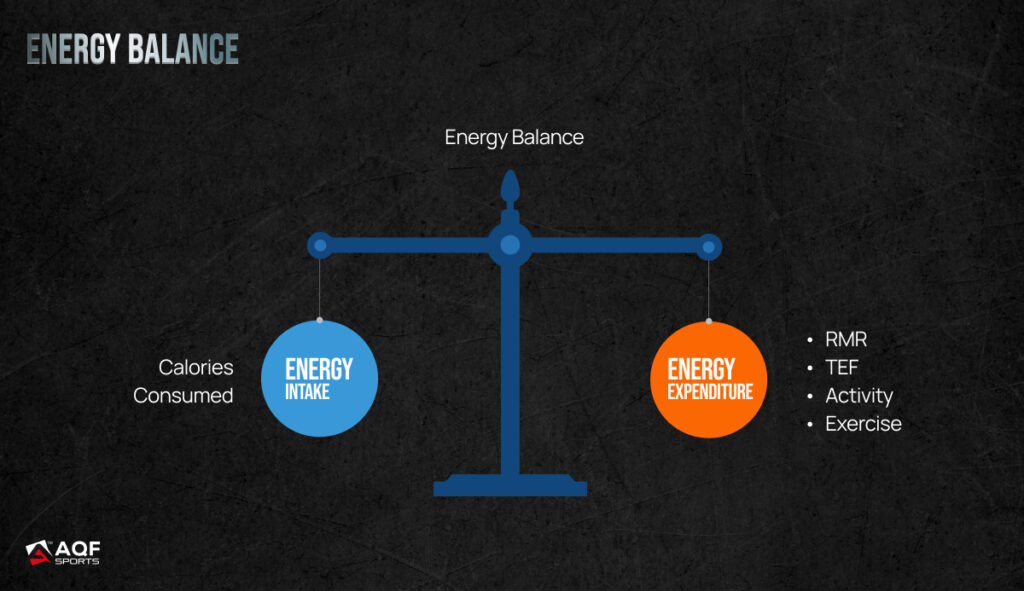
Nutrient Intake:
Diet provides the body with essential nutrients like vitamins, minerals, and macronutrients (carbohydrates, proteins, and fats) necessary for various bodily functions.
Carbohydrates, proteins, and fats are the major players in our daily nutritional requirements, constituting a whopping 90% of the weight in our diets and providing us with 100% of our energy needs. [2]
But here’s where it gets interesting: each nutrient packs a different calorie count per gram:
- 1 Gram of Carbohydrates and proteins = 4 calories
- 1 Gram of Fats = 9 calories!!
Now, let’s talk about how fast these nutrients are digested in our bodies.
These nutrients don’t just differ in calories; they also vary in how quickly they give us that energy boost. Carbs are the sprinters, providing a rapid energy surge, while fats take their time, being the marathon runners of the group.
Inside our intestines, these macronutrients go through a transformation, breaking down into their fundamental components:
- Carbohydrates transform into sugars.
- Proteins morph into amino acids.
- Fats break down into fatty acids and glycerol.
Our bodies put these basic building blocks to good use, creating the necessary substances for growth, upkeep, and our daily hustle and bustle. This includes crafting other carbohydrates, proteins, and fats, which are all essential for keeping us in tip-top shape.
Pro Tip: Consume a balanced diet that includes a variety of nutrient-dense foods to meet your body’s nutritional needs. Prioritize fruits, vegetables, lean proteins, and whole grains.
Suggested Read: What Are The Best Foods To Eat For Muscle Growth?
Macronutrients and Their Food Sources
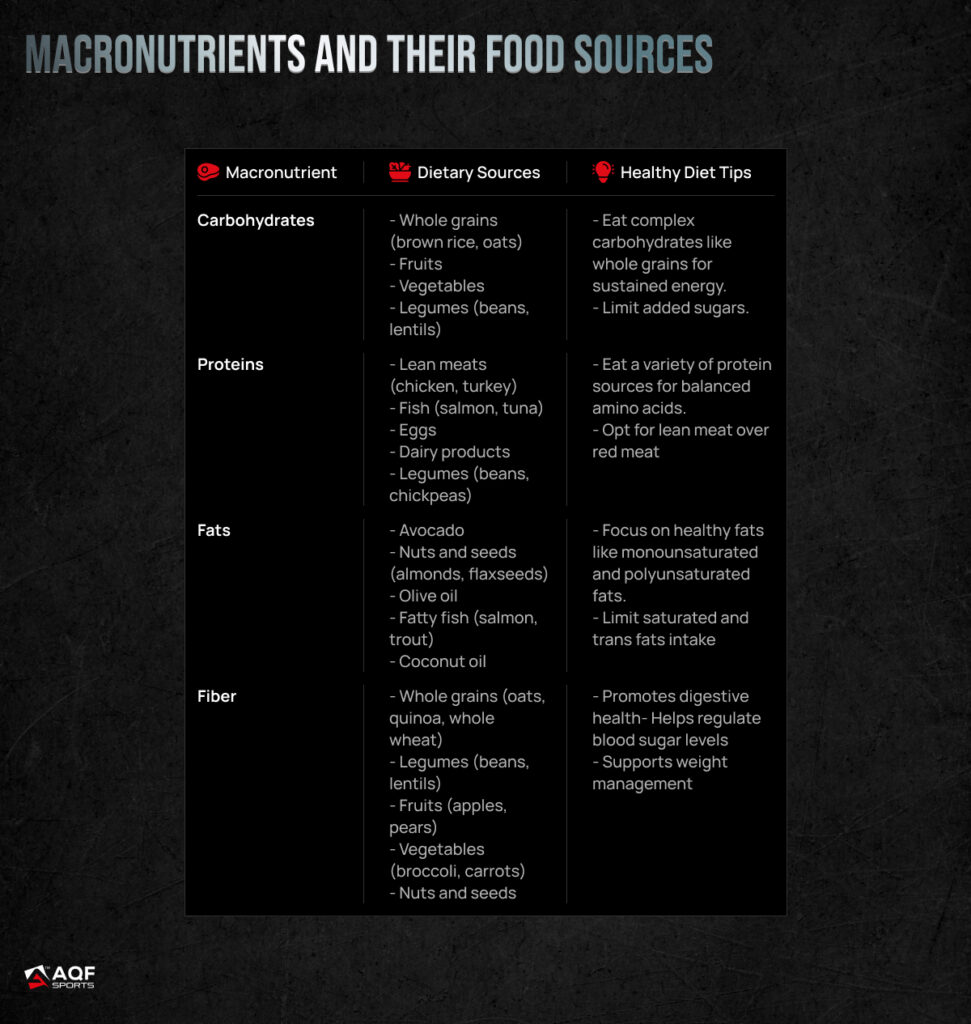
Exercise for Health:
Regular physical activity has numerous health benefits, including improved cardiovascular health, enhanced mood, and better metabolic function. [3]
Pro Tip: Aim for at least 150 minutes of moderate-intensity aerobic exercise or 75 minutes of vigorous-intensity aerobic exercise per week, along with strength training exercises.
Muscle Bulking:
Resistance training, such as weight lifting, helps build and maintain muscle mass, which is crucial for overall strength and metabolism.
Pro Tip: Incorporate strength training exercises into your fitness routine at least two days a week to promote muscle health.
Resistance Training Exercises for Muscle Bulking:
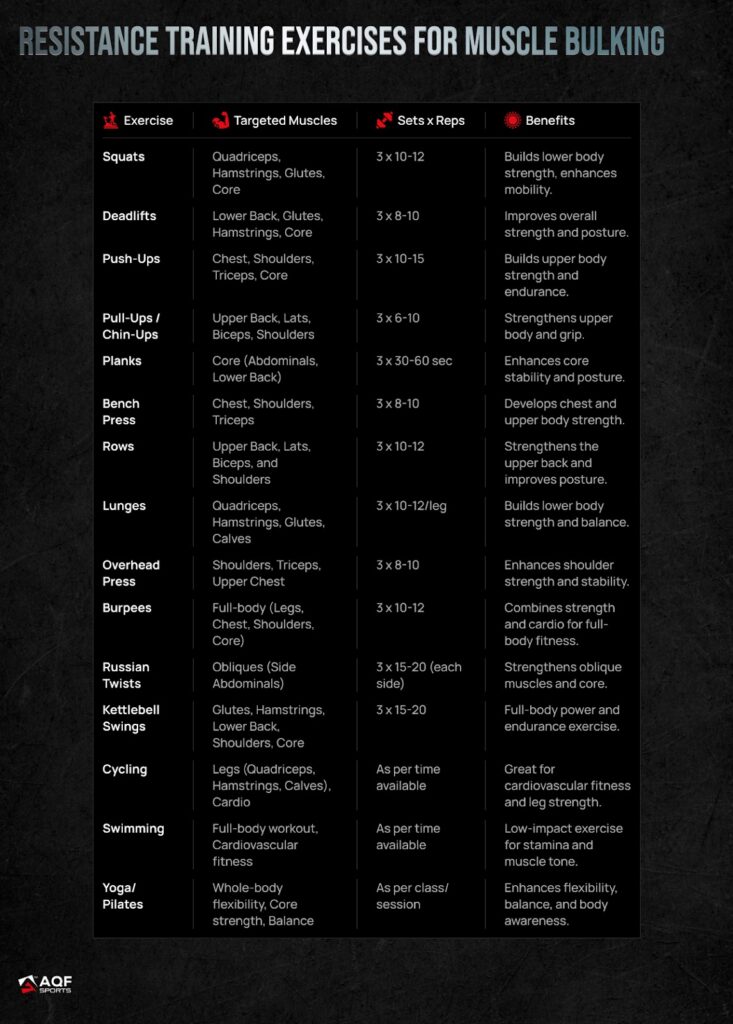
Disease Prevention:
A healthy diet and regular exercise are associated with a lower risk of chronic diseases, including heart disease, diabetes, and certain cancers.
Pro Tip: Focus on whole, unprocessed foods and engage in consistent physical activity to reduce your risk of chronic diseases.
Suggested Read: Your Guide to Ectomorph Body Type, Diet, and Workout Routine
Mental Health:
Diet and exercise have been linked to improved mental health, including reduced symptoms of anxiety and depression. Exercise prompts your brain to release endorphins and serotonin, “the feel good” chemicals which make you feel happy and relaxed [4].
Pro Tip: Prioritize a diet rich in nutrients that support brain health, and engage in regular exercise to boost mood and reduce stress.
Recovery and Performance:
Proper nutrition and hydration play a critical role in post-exercise recovery and athletic performance.
Pro Tip: Pay attention to your diet before and after exercise to optimize performance and enhance recovery. Consult a sports nutritionist for personalized guidance if you’re an athlete.
How do exercise and diet work together to improve longevity?
Who doesn’t want to live longer? Scientific research demonstrates that diet and exercise work in synergy to reduce aging signs and increase your health and longevity. Here’s how they work together and expert recommendations to optimize longevity:
Cellular Health:
Exercise and a balanced diet can improve cellular health by reducing oxidative stress and inflammation, of which contribute to aging and age-related diseases. In other words, exercise promotes anti-oxidative cellular processes to preserve your natural health and beauty [5].
Essential Nutrients with Sources Which Promote Health
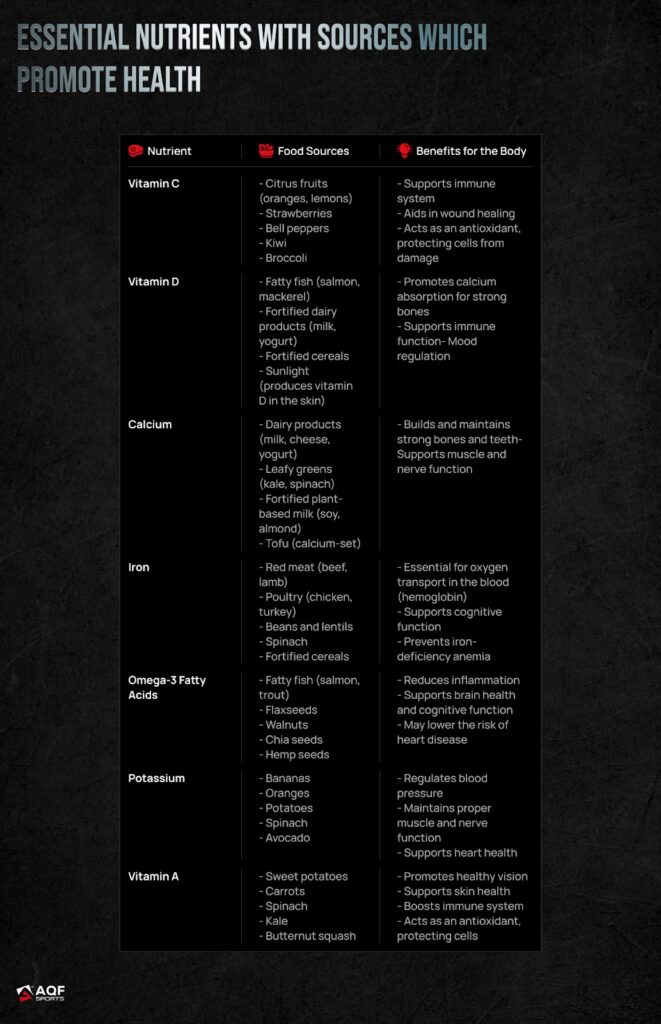
Pro Tip: Include antioxidant-rich foods (like berries and leafy greens) in your diet and engage in regular physical activity to support cellular health.
Heart Health:
A heart-healthy diet and regular exercise can lower the risk of heart disease, which is a leading cause of premature death.
Pro Tip: Follow a diet low in saturated and trans fats, and rich in fiber, and engage in aerobic exercises to keep your heart strong. Aim for at least 150 minutes of moderate-intensity exercise weekly.
Metabolic Health:
Exercise and a balanced diet help regulate blood sugar levels and reduce insulin resistance. You may lower type 2 diabetes risks by reducing 5-7% of your body fat [6].
Pro Tip: Choose whole grains, lean proteins, and vegetables in your diet and engage in regular aerobic and strength-training exercises to maintain metabolic health.
Brain Health:
Diet and exercise have been linked to improved cognitive function and a lower risk of neurodegenerative diseases like Alzheimer’s.
Pro Tip: Consume omega-3 fatty acids (found in fatty fish), antioxidants, and engage in both aerobic and brain-stimulating exercises (like puzzles) to support brain health.
Muscle and Bone Health:
Regular exercise, especially strength training, helps maintain muscle mass and bone density, reducing the risk of fractures and frailty as you age.
Pro Tip: Include resistance exercises, along with adequate protein intake, calcium, and vitamin D, in your diet to promote muscle and bone health.
Weight Management:
Exercise aids in weight maintenance and loss.
On the other hand, a balanced diet provides the nutrients necessary for overall health.
Pro Tip: Combine exercise with a calorie-controlled diet to achieve and maintain a healthy weight. Focus on portion control and mindful eating.
Suggested Read: How to Get Rid of Lower Belly Fat: Diet Tips and Exercises
Reduce Inflammation:
Chronic inflammation is associated with many age-related diseases. Both diet and exercise can help reduce inflammation markers.
Pro Tip: Emphasize anti-inflammatory foods (such as fatty fish, nuts, and colorful fruits and vegetables) in your diet and engage in regular physical activity.
Best Diet to Enhance Longevity:
Some diets, like the Mediterranean or the Okinawan diets, have shown links to increased longevity due to their nutrient-rich and balanced nature.
Pro Tip: Consider adopting a longevity-promoting diet like the Mediterranean diet, rich in whole foods, healthy fats, and antioxidants.
A well-balanced diet and regular exercise are potent combinations for enhancing longevity and improving overall health. To reap the full benefits, it’s crucial to maintain consistency in both aspects of your lifestyle.
How can diet and exercise affect your body weight and composition?
Diet and exercise are pivotal factors influencing body weight and composition, and they work together in a complex interplay. Here’s how diet and exercise affect your weight and composition:
Diet’s Impact:
Caloric Intake:
Diet is the primary driver of caloric intake. Consuming more calories than your body needs can lead to weight gain.
Pro Tip: Maintain a balanced diet. Follow portion control to avoid excessive calorie intake. Monitor calorie consumption, especially when trying to manage or lose weight.
Nutrient Composition:
The types of nutrients you consume can influence your body composition. A diet rich in protein, for instance, can support muscle mass.
Pro Tip: Prioritize nutrient-dense foods such as lean proteins, whole grains, and fruits and vegetables, to support a healthy body composition.
Boost Metabolism:
Diet can influence your metabolism. Eating frequent, balanced meals can help stabilize blood sugar levels and promote efficient calorie burning.
Pro Tip: Consume regular, balanced meals and snacks to maintain steady energy levels and optimize metabolism.
Exercise’s Impact:
Caloric BURN:
Exercise burns calories, contributing to weight loss or maintenance by creating a caloric deficit.
Pro Tip: Engage in regular physical activity to help control body weight. Combining aerobic and strength training exercises can be particularly effective.
Top Calorie Burning Exercises [Estimated Caloric burn for 70KG (155 Lbs) Individual]
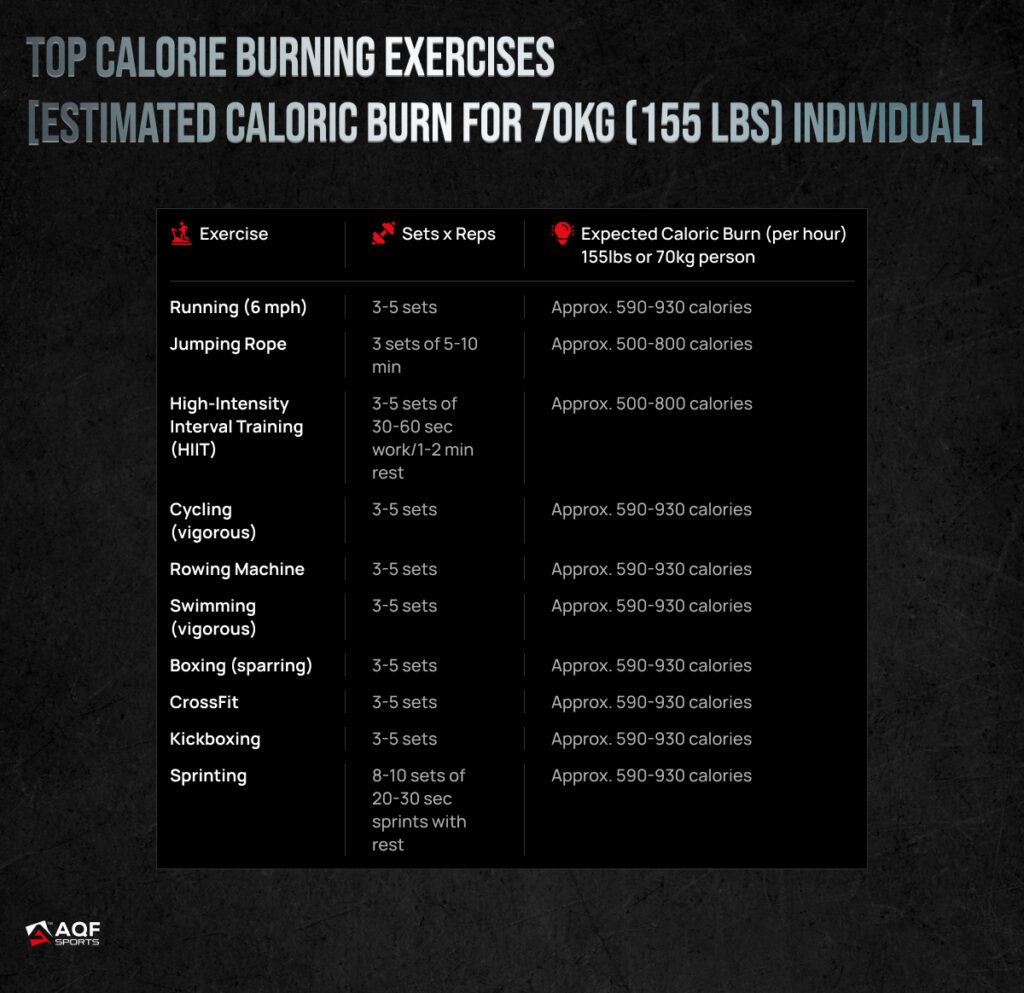
Protein Building Blocks:
The rule is simple:
Less carbs + more protein + More Exercise = More Amino Acids & Muscle Bulking
Include strength training exercises in your routine at least two days a week to support muscle development and metabolism.
Body Composition:
Exercise can help shift your body composition by reducing body fat and increasing lean muscle mass.
Pro Tip: Aim for a well-rounded exercise program that includes cardiovascular activities (like running or cycling) for calorie burning and strength training for muscle building.
Suggested Read: 30 Minute Cardio Workout at Home – No Equipment Required
How to Consistently Follow Diet and Exercise for Lasting Health and Weight Loss?
Time management and consistency are key to lasting health and consistent weight loss. Without healthy time management and discipline, your results will slow down, and ultimately, you may feel demotivated to continue your diet and exercise routine.
Make self-care and exercise a priority, and eventually, you will be addicted to doing things that really make you feel good about yourself.
Moreover, remember that your health and well-being matter just as much as your family, friends, and work!
Find Motivation to Chase Your Goals:
Find what truly gets you pumped about eating well and working out. It could be feeling great, looking good, or just having more energy.
Goals: Make ’em clear and doable. Saying, “I want to lose 10 pounds in three months” beats “I want to lose weight.”
Disciplined and Willpower:
Sometimes, you’ll need to resist the pizza and Netflix binge in favor of a salad and a jog.
Think of willpower like a battery that drains during the day. Use it wisely; don’t test it with a pantry full of cookies.
Handling Stress and Emotions:
Avoid Stress Eating. Stress can drive you to snack on chips.
Try stress-relief methods like deep breathing or a walk instead.
Gain more Emotional Awareness. Learn to recognize when you’re eating your feelings and find healthier ways to cope.
Seek Support And Accountability:
Surround yourself with folks who cheer you on. Share your goals, and they might join you on your health journey.
Telling someone about your plans can keep you honest. They’ll ask, “Did you hit the gym today?”
Stock Up on Healthy Food and Exercise Equipment:
Stock your fridge and pantry with nutritious stuff. When it’s easy to grab an apple, you’ll eat more apples.
Get workout gear handy, such as dumbbells, exercise balls, kettlebells, skipping rope or a waist belt to make exercising easier. Invest in quality workout clothing and shoes to pump up your motivation levels.
Build Good Habits:
Repetition is how habits form. Do something often enough, and it becomes second nature.
If you’re in a bad habit loop, tweak the cues, routines, or rewards to make it a good loop.
Start Small and Believe in Yourself:
Confidence is your secret weapon. Believe you can make these changes, and you’re more likely to succeed.
Don’t aim to run a marathon on day one. Start with a short jog or a single push-up and build from there.
Time Management:
Schedule exercise and meal prep into your day, just like any other appointment.
Stick to your routine as much as possible. Regularity is key to seeing progress.
Think Positive and Track Progress:
Negative thinking can be a buzzkill. Replace “I can’t do this” with “I’ll give it a shot.”
Keep tabs on your progress, whether it’s pounds lost, miles run, or veggies eaten. It’s motivating to see how far you’ve come.
Stick to a Balanced Diet Plan:
The Bottomline
Diet and exercise work together for lasting health and weight management. You can not neglect one and expect results from the other. In fact, the key is to strike a balance between healthy eating and exercise.
Explore More Topics
- Jumping Rope and Weight Loss: What Does Jump Roping Do to Your Body?
- Benefits of Boxing for Fitness for Physical and Mental Fitness
- Understanding Different Types of Gym Equipment: A Comprehensive Guide
- Summer Body Workouts: Exercises for a Beach-Ready Physique
References:
[1] The importance of Energy Balance
[3] Benefits of Physical Activity
[4] Exercise and Mental Health
[5] Effect of Physical Activity/Exercise on Oxidative Stress and Inflammation in Muscle and Vascular Aging[6] Diet Tips to Improve Insulin Resistance



